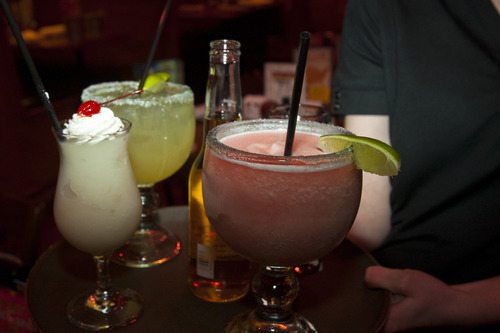This is an archived article that was published on sltrib.com in 2013, and information in the article may be outdated. It is provided only for personal research purposes and may not be reprinted.
After sober debate, the Utah House voted Monday to clarify that Utah restaurant patrons may sip alcoholic beverages while looking at menus before actually ordering food.
The Utah Department of Alcoholic Beverage Control recently created an uproar by issuing a wave of citations to restaurants saying such a practice was a violation of current state law. The agency later backed off the effort.
In response, the House decided to vote 60-8 to pass HB218 and clearly allow imbibing while perusing menus. It also made several other tweaks to Utah liquor law affecting how many permits are available for different types of establishments. The measure now goes to the Senate.
"Through the holidays, a number of establishments were issued citations for $500 fines because patrons … went in, sat down, ordered some type of alcoholic beverage and got up and did not order food," said Rep. Gage Froerer, R-Huntsville.
After an outcry over citations, DABC's director said there had been a misunderstanding about the directive and that customers were allowed to be served so long as they signaled an intent to order food. Even so, the warning has had a chilling effect on the industry. Restaurants such as Chili's Grill & Bar in downtown Salt Lake City still will not serve alcoholic beverages until diners actually place an order.
Froerer said the bill would clearly show that diners may imbibe as long as they "sit down and look at the menu with the intent to dine."
The bill would also create a separate license category for fine-dining restaurants, which state law now puts in the same category with public bars — for which permits are scarce.
Such a shortage of permits now exists that 19 applicants are on a waiting list — and some have been there for longer than a year. The proposed legislation would make 25 more licenses available by converting unused permits for reception centers — which are not required to serve food — into fine-dining permits. There would be no additional licences for public bars.
Population quotas determine the number of available liquor licenses.
The bill also would allow fine-dining clubs where meals are served, such as Ruth's Chris Steak House and the New Yorker, to have their own category of licenses instead of being lumped together with public bars, which are not required to serve food. Changes would allow about 20 extra licenses, Froerer said.
The House also adopted an amendment by Rep. Jeremy Peterson, R-Ogden, that would increase the number of licenses available for social clubs, essentially bars, by nine. Peterson said that should handle most applications now on file.
HB218 also would allow fraternal organizations and veterans groups to open their eateries to the public. Froerer said such groups often hold pancake breakfasts or other meals to raise money for community service.
A few legislators were concerned about changes that would increase the number of licenses. Rep. Jack Draxler, R-North Logan, said he worries "about this continuing trend to liberalize our alcohol laws."
More liquor licenses
Restaurants could get a round of liquor licenses freed up under a bill that received preliminary approval from the state Senate Monday.
SB167, sponsored by Sen. John Valentine, R-Orem, would allow restaurant chains to get one master liquor license instead of having to get a separate license for each eatery.
That would free up a number of restaurant licenses, which are in short supply now. Restaurateurs have complained in recent years that the shortage of licenses has prevented them from expanding in the state.
The master license would be more expensive, Valentine said, but offers predictability, because a chain that wants to grow won't have to worry about whether a license would be available.
Senators voted 27-1 to move SB167 to a final vote, likely later this week. Sen. Margaret Dayton, R-Orem, cast the only dissenting vote.
— Robert Gehrke



